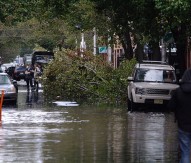
Polar science receives EU funding boost
A new initiative to enhance the integration of Europe’s scientific and operational capabilities in the polar regions has been funded by the EU Horizon 2020 programme.
The €2m five-year EU-PolarNet programme brings together 22 of Europe’s internationally respected multidisciplinary research institutions to develop and deliver an integrated European polar research programme that is supported by access to first-class operational polar infrastructures.
EU-PolarNet will involve stakeholders from the outset to create a suite of research proposals whose scientific outcomes are directly relevant and beneficial to European society and its economy.
Polar issues have been rising up the political agenda across Europe over the past decade. The level of investment now being made by governments is a clear demonstration of how critical polar research is for forming policies, including those relating to climate change, energy security, global food security, innovation and economic growth.
By establishing an ongoing dialogue between policy makers, business and industry leaders, local communities and scientists, EU-PolarNet aims to create an integrated European research programme for the Antarctic and the Arctic. This legacy from EU-PolarNet will be sustained into the future by the European Polar Board, all of whose members are integrally involved with the project.
A key role for EU-PolarNet is to co-operate closely with the European Commission to provide support and advice on all issues related to the polar regions.
Dr Andrea Tilche, head of the Climate Action and Earth Observation Unit in the European Commission’s DG for Research and Innovation, said: “The European Commission welcomes this new Coordination Action which brings together polar scientific communities and other stakeholders. It creates a new ‘home’ where science and innovation on polar issues can be discussed for the benefit of our planet and our societies.”
British Antarctic Survey director Professor Jane Francis added: “I am very pleased to be involved with this new Coordination Action. The UK has a vibrant scientific community and excellent polar infrastructure – especially in Antarctica. With this new network there is huge potential not only to shape future European polar research programmes but also to enhance the high-quality operational support for science through even better co-operation and co-ordination. Our clear ambition to connect science with society demonstrates our commitment to working closely with business and policy making communities to generate new knowledge and advice that will help people live with and adapt to future environmental change.”
EU-PolarNet is a Horizon 2020-funded Coordination Action.




